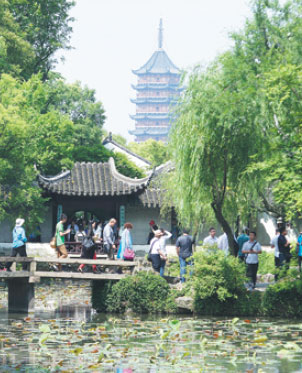Humble Administrator Garden's proud legacy
By Erik Nilsson in Suzhou, Jiangsu (China Daily) Updated: 2017-01-23 06:59Azaleas in spring. Lotuses in summer. Hibiscuses in autumn.
Plum blossoms in winter.
China's Eden is a city of seasons, in which different blooms blaze in shades that change as the calendar's pages turn.
Suzhou's ancient gardens are perfect places to see the shifting seasons manifest as flora in flux.
And its Humble Administrator Garden (Zhuozheng Yuan) is celebrated as the best among the best.
The largest garden in China's garden city is considered the most classical of the classical in the country.
It's not only that it covers nearly 52,000 square meters. More importantly, it's about how that terrain has been meticulously manicured.
Stone walkways slalom among pavilions and ponds.
Vines climb. Trees tower. Flowers flare.
A large lake ripples over a fifth of the garden.
The destination is also a petrophile's paradise, riddled with rockeries. Many are Taihu Lake stones - peculiarly punctured and crinkled by millennia of undercurrents at the bottom of the massive water body.
Buildings are actually constructed around the splendors of the seasons.
One pavilion is situated so that visitors can see a different botanical wonder in a different cardinal direction in different seasons - jasmine in the spring, lotuses in the summer, bamboo in the fall and plums in the winter, when the trees' petals flutter like snowflakes in the wind.
Eminent official Wang Xianchen, who declared his intention to retreat from the political sphere's tumult upon retirement, constructed the garden over 16 years, starting from 1509.
He quoted a prominent poem to explain his motivation: "I am not very intelligent, but I am humble. I want to water my flowers and plant vegetables."
The grounds were reconfigured as they changed ownership in the following centuries and declared a UNESCO World Heritage site in 1997.
Unique buildings endow the landscape with a cultural charm beyond botany.
The Listening to Rain Pavilion was constructed as a dry place to hear raindrops play percussion on lotus leaves.
Fragrant Isle's name is a misnomer. It's neither aromatic nor an islet but rather a structure designed to resemble a boat. The shape is a reference to philosopher Laozi's declaration that humans should strive to be empty vessels - in this case, the seafaring kind - rather than obsessing with self-fulfillment and navigating courses for our own benefit.
One of the garden's later owners, who made his fortune selling fans, constructed two pavilions shaped like the product he produced.
An arrogant aristocrat, who believed nobody was worthy of gracing his presence, built the With Whom Shall I Sit Pavilion.
Ducks bobble in a nearby pond that's pierced by three manmade hills. The reference to longevity is a miniaturized model of the three mountainous islands that Taoism's Eight Immortals are believed to inhabit.
Also, water represents yin, while peaks represent yang - and are closer to heaven, both physically and metaphorically.
The balance of these Taoist forces is also symbolized in the garden's bonsai.
These twisting trees are purposefully cultivated so they're half dead, half alive.
And they, too, reference longevity. The oldest is a 400-year-old papaya plant, whose fruit is used for medicine rather than food.
Indeed, visitors who explore Humble Administrator Garden will discover why it's the pride of Suzhou - no matter what time of year they arrive.
|
Humble Administrator Garden, the largest garden in the garden city of Suzhou. Wei Xiaohao / China Daily |
- 'Cooperation is complementary'
- Worldwide manhunt nets 50th fugitive
- China-Japan meet seeks cooperation
- Agency ensuring natural gas supply
- Global manhunt sees China catch its 50th fugitive
- Call for 'Red Boat Spirit' a noble goal, official says
- China 'open to world' of foreign talent
- Free trade studies agreed on as Li meets with Canadian PM Trudeau
- Emojis on austerity rules from top anti-graft authority go viral
- Xi: All aboard internet express












